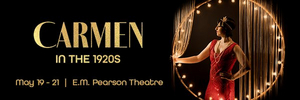Ballet Company Swings CARMEN Into Roaring Twenties With Jazzy Reimagination
Swing dance will go en pointe with this playful yet fiery twist on an opera classic.

Ballet Co.Laboratory swings back to the Roaring Twenties to close out their 5th Anniversary Season with a bang. Carmen, one of the most well-known operas of all time, takes a leap into modernism with Ballet Co.Laboratory's Carmen in the 1920s, on stage May 19-21 at E.M Pearson Theatre (Concordia University campus).
Swing dance will go en pointe with this playful yet fiery twist on an opera classic. Instead of taking place in 1820s Spain as in the opera, Ballet Co.Laboratory's rendition will be set in New York City during the Jazz Age. Accompanied by a live jazz ensemble to a fresh arrangement of Georges Bizet's bold score, choreographer Zoé Emilie Henrot's take on Carmen's journey of fated love bristles with excitement, danger, and destiny - and a fearlessly feminist perspective.
Ballet Co.Laboratory's reimagination of Carmen places the narratives of its female characters center stage. "Most often, Carmen's story is told from her love interests' point of view. I wanted to give Carmen and all the other women a chance to tell their own stories," shares Artistic Director and Choreographer Zoé Emilie Henrot. Henrot's production intentionally shows the differentiation in class structure between all of the characters, as disparity between social classes was one of the defining contradictions of the Prosperity Decade. Solo moments for different characters provide backstory and depth to their identities.
Although Ballet Co.Laboratory's characters will have slightly different names and occupations than the original tale, opera lovers will recognize their unique desires and flaws. Don José becomes Donny, a gangster, and Escamillo becomes Eddy, a famous baseball player. Carmen's tenacity is on full display against the motivations of these love interests, whose failings eventually spell disaster for the protagonist. Dancer Rosa Prigan, who will dance the role of Carmen, reflects, "We often think of Carmen in one way - as a temptress - but there is more to her than meets the eye. I think it is our challenge to look closer to discover that she, like the rest of us, wants the freedom to make her own choices and mistakes."
While the professional dancers of Ballet Co.Laboratory are accustomed to reimagining the classics, putting the art of swing dance on pointe was a new challenge, one that Henrot says the dancers embraced. Social dance aficionados adept in Prohibition era moves will recognize the Charleston in many of its various forms and partnered swing movements, especially in the second act's speakeasy scene. The speakeasy scene also pays homage to the ways in which queer culture blossomed in 1920s nightlife with a character (Lee - adjacent to Lillas Pastia from the opera) modeled after Marlene Dietrich, a queer icon and gender-bending presence on the silver screen.
To lend ultimate authenticity to the Jazz Age setting, choreographer Zoé Henrot worked with collaborator Richard Erickson to adapt, arrange, and compose a new score for a five-piece jazz ensemble, based on the
rich melodic nature of George Bizet's opera. Local swing dance artist Hannah MacKenzie-Margulies also led workshops with the ballet dancers to enhance their exploration into the classic steps and styles of this dance genre.
Audiences will revel in recognizable motifs and new ideas that will have toes tapping and shoulders swaying. The lavish music feels right at home with the flapper era which echoed with the clinking of glasses, the energetic hum of lavish parties, and the smooth sounds of jazz.
It is only fitting that like the Roaring Twenties, (spoiler alert) Carmen in the 1920s ends in tragedy. Destiny may be set for Carmen, but she teaches us to love freely and unconditionally despite it all.
Tickets begin at $30 and are available for purchase online at balletcolaboratory.org/season or by calling the Ballet Co.Laboratory Box Office at 651.313.5967.
Comments

Videos

